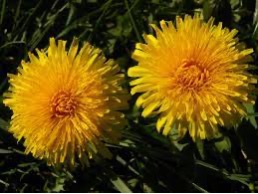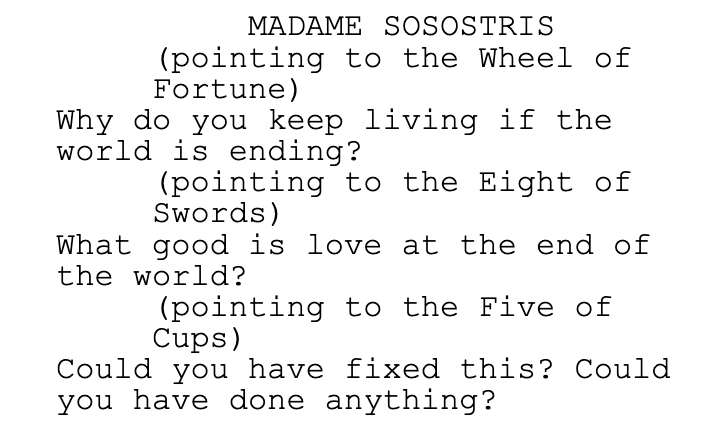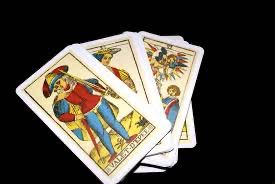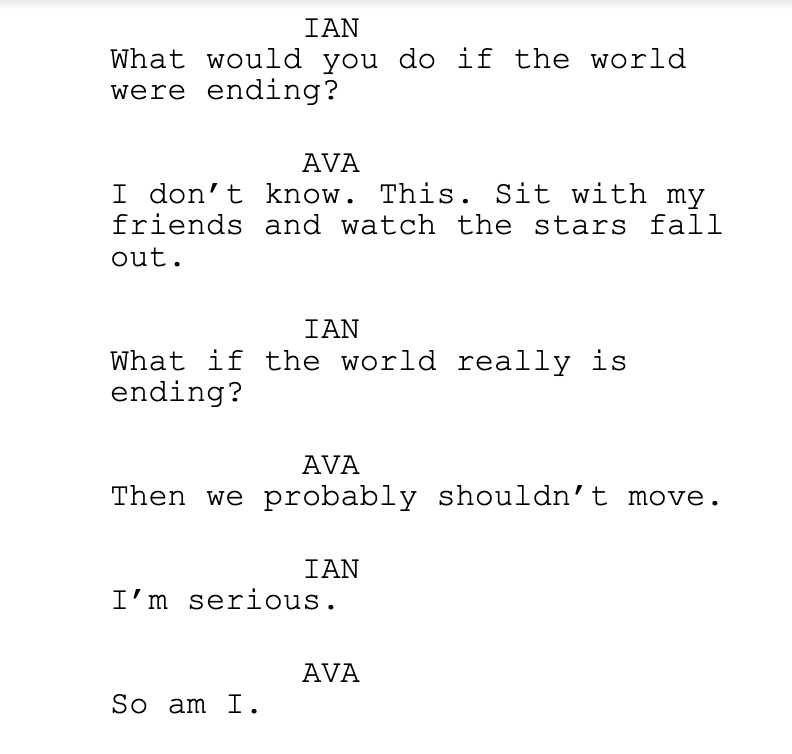‘If the world were ending, I’d hope that all my friends were in my kitchen, watching the news, while I made sure they were all fed before it all went dark.’
I have been writing a screenplay for a short film called String Theory. It started, believe it or not, as a college essay. American universities typically require at least one, if not three or four ‘supplemental essays’ of about 250-300 words each alongside the generic application, which itself includes an essay of about 500 words. In my final year of high school, I applied to the University of Chicago, who are well-known for their abstract and open supplemental essay questions. The one I chose to answer read: ‘Use the power of string to explain the biggest or smallest phenomenon.’ I wrote a half-poem, half-screenplay about strings and fate and free will and God.
I did not get into the University of Chicago. But I had a three-page rumination on philosophy burning a hole in my desktop folder. When I began to write screenplays for the Visualising Peace project, I stumbled across this file on my laptop and decided to rewrite it. In this version, I shift the topic of conversation to include a discussion about the end of the world rather than the highly diluted religious waffling I wrote when I was 17. I also included a scene involving a tarot reading at the beginning of the screenplay, which was a new concept.

I wanted this piece to primarily be a conversation about the relationship between free will and peace. These two concepts are inherently intertwined. If free will exists, then we are responsible for our actions and thus for any conflict or violence we help to create. If it doesn’t, then we have no obligation to work toward peaceful relationships or eliminate conflict. I’m more inclined toward believing in free will over fate or predestination, but that then leaves me with a second question: how do I go about creating peace? It is a monumental task for someone who can’t call off any wars single-handedly or universally eradicate femicide or racism. There is of course the option of protesting, writing letter campaigns, or signing petitions. Although those are all valid and effective ways of contributing to peace, they can only ever achieve things incrementally and in collaboration with others. In the search for a peace which is both internal and external, we have to look further.

While I was travelling in Ireland with a few friends, we stayed with one friend’s aunt, Maureen. Maureen worked at a tourist office, taught her young daughter three languages (English, French, and Gaelic), and had a distant cousin from France in her guest bedroom while the girl worked and learned English. For that weekend she also had four university students sleeping on the floor in her living room. While I stayed with her, she patiently talked her cousin through the trickier parts of English grammar, helped her daughter with homework, and gave us a full bottle of gin to mix drinks with. She invited some friends of hers, who were refugees from Ukraine, over for dinner and explained to them which school they should enroll their children in based on the programs, curricula, and support systems available to them. Maureen taught me a lot about peace in very little time.

I learned from her that although we as individuals cannot end wars globally or fix whole government systems, we can cook dinner for someone when they need it. We can teach them what we know, expecting nothing in return. We can make their transition from a war-torn country to a completely new and foreign one, where not even the language we read remains the same, a little bit easier. We can make jokes at parties that get translated from one language into another, passed down the dinner table like a plate of food. We cannot create world peace on our own, but we can build peace in the world(s) around us by helping others, many of whom are demoralized from seeing the same violent images and foretellings of the apocalypse day in and day out, some of whom who have seen that violence with their own eyes, and give them space to just experience kindness.
The film I am making is a film about that weekend I spent in Ireland and the lessons about peace-making that I took from it.

What do you think?
- What relationship do you see between free will and our individual responsibility to nurture peace?
- What kinds of things do/can you do in your everyday life that help to make the world around you more peaceful?
- How can personal, everyday peace-building create larger forms of peace?
- Are kindness and love essential building blocks of peace in the world?
- How might you respond to the suggestion that focusing on love and kindness as essential peace-building tools is simply ‘naive’ or ‘ineffective’?
If you enjoyed this item in our museum…
You might also enjoy No Love Lost, Hyacinths, Peace From Pieces, Addressing Ahmadinejad, Care for Animals, and Oseh Shalom.
Arden Henley, December 2022